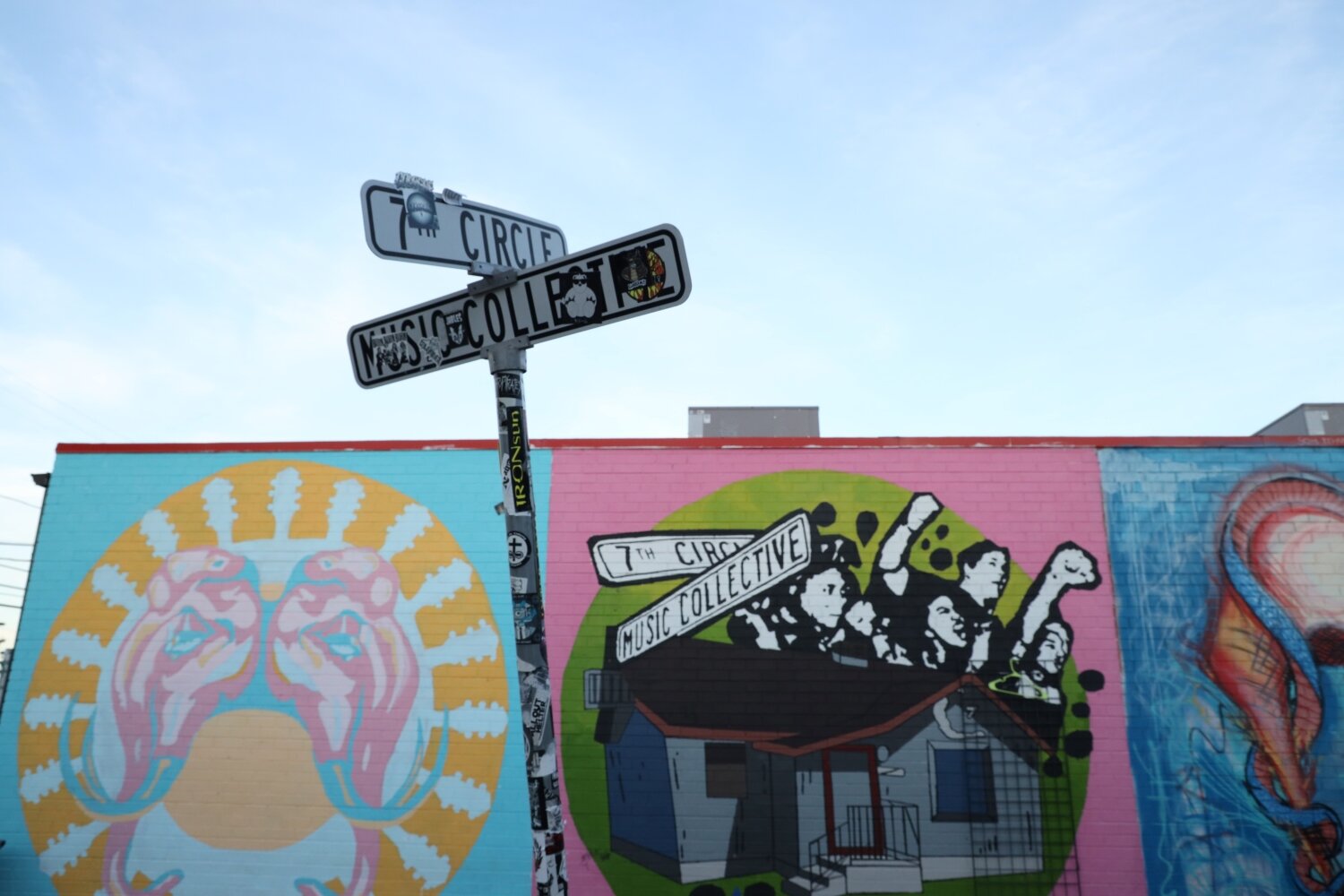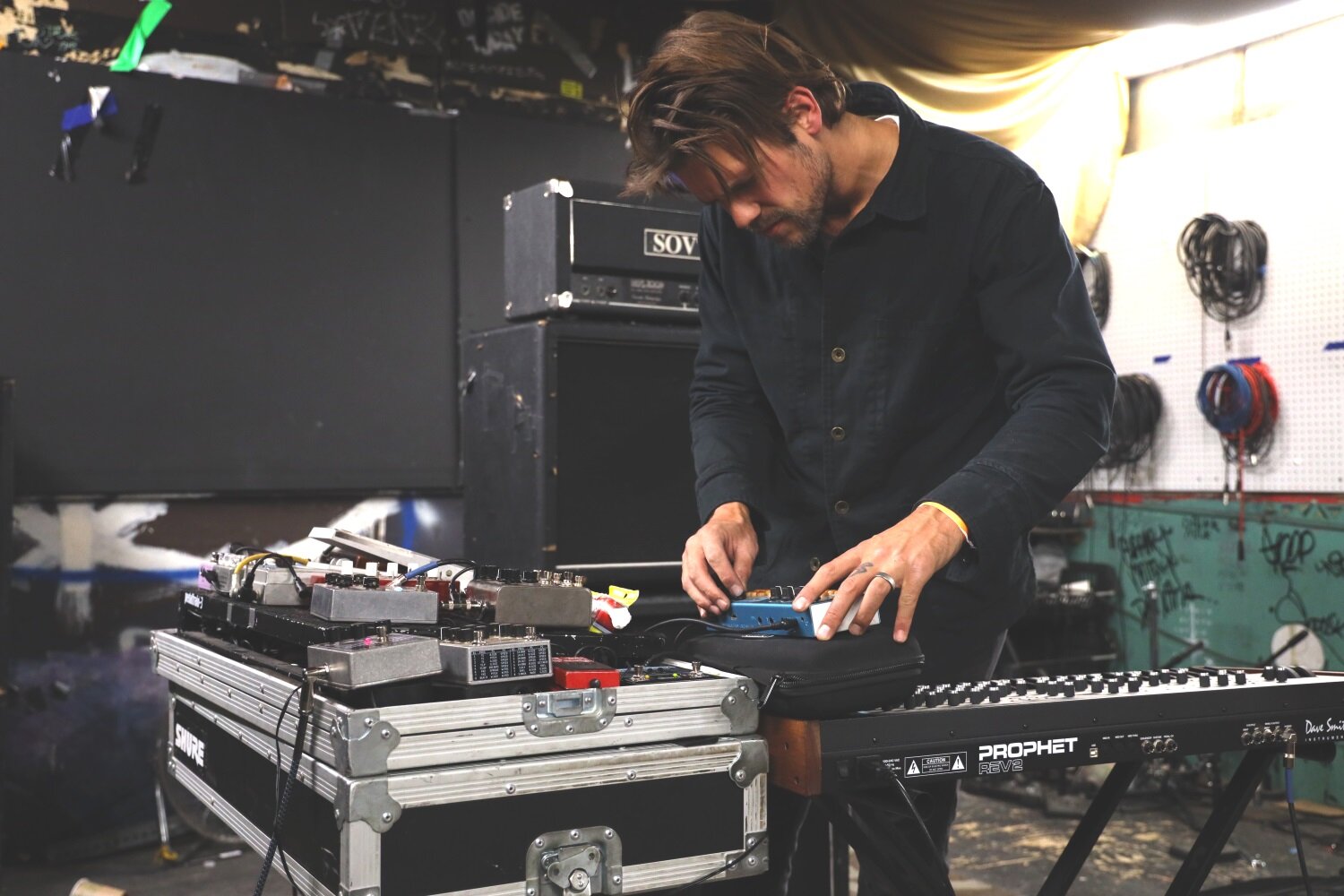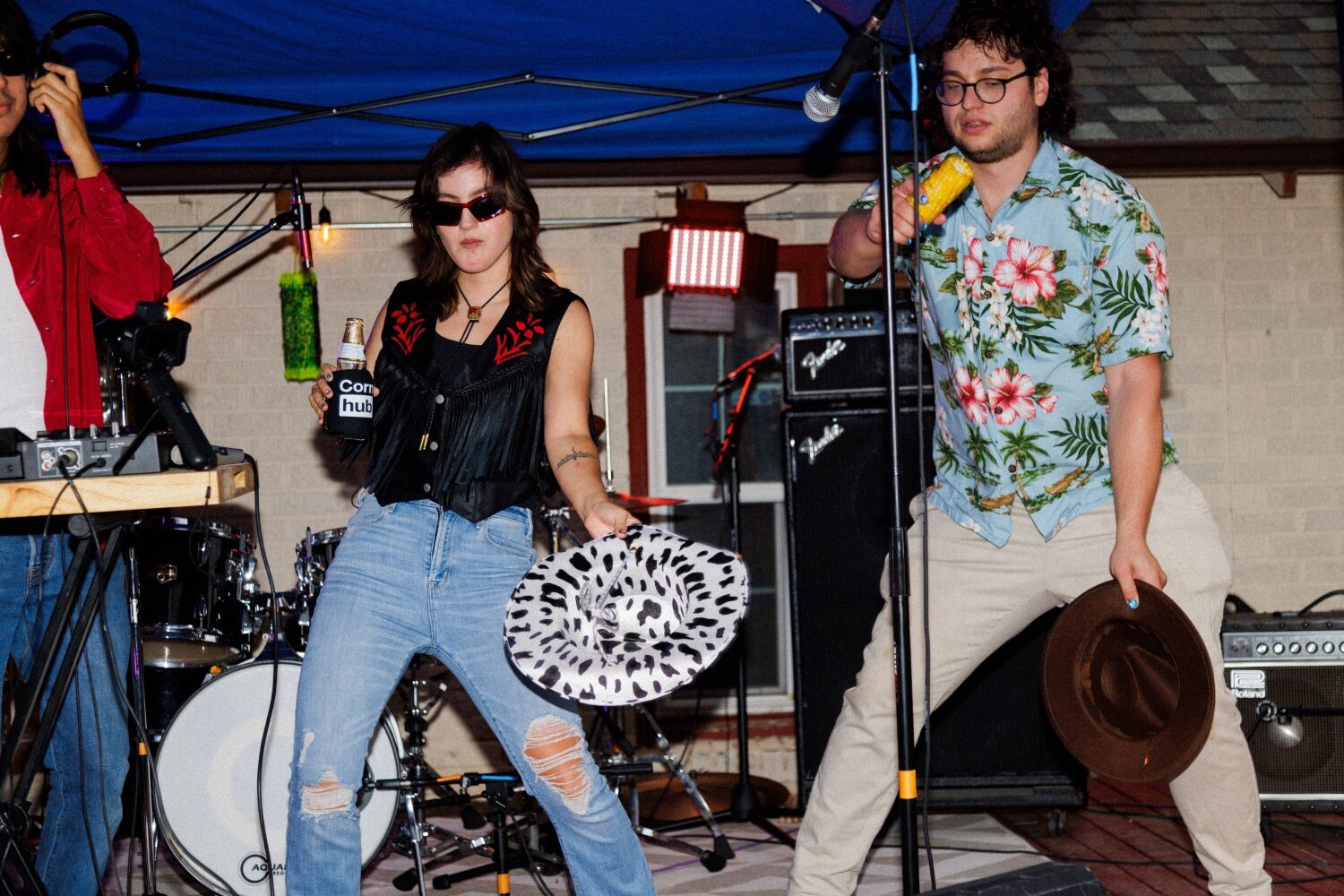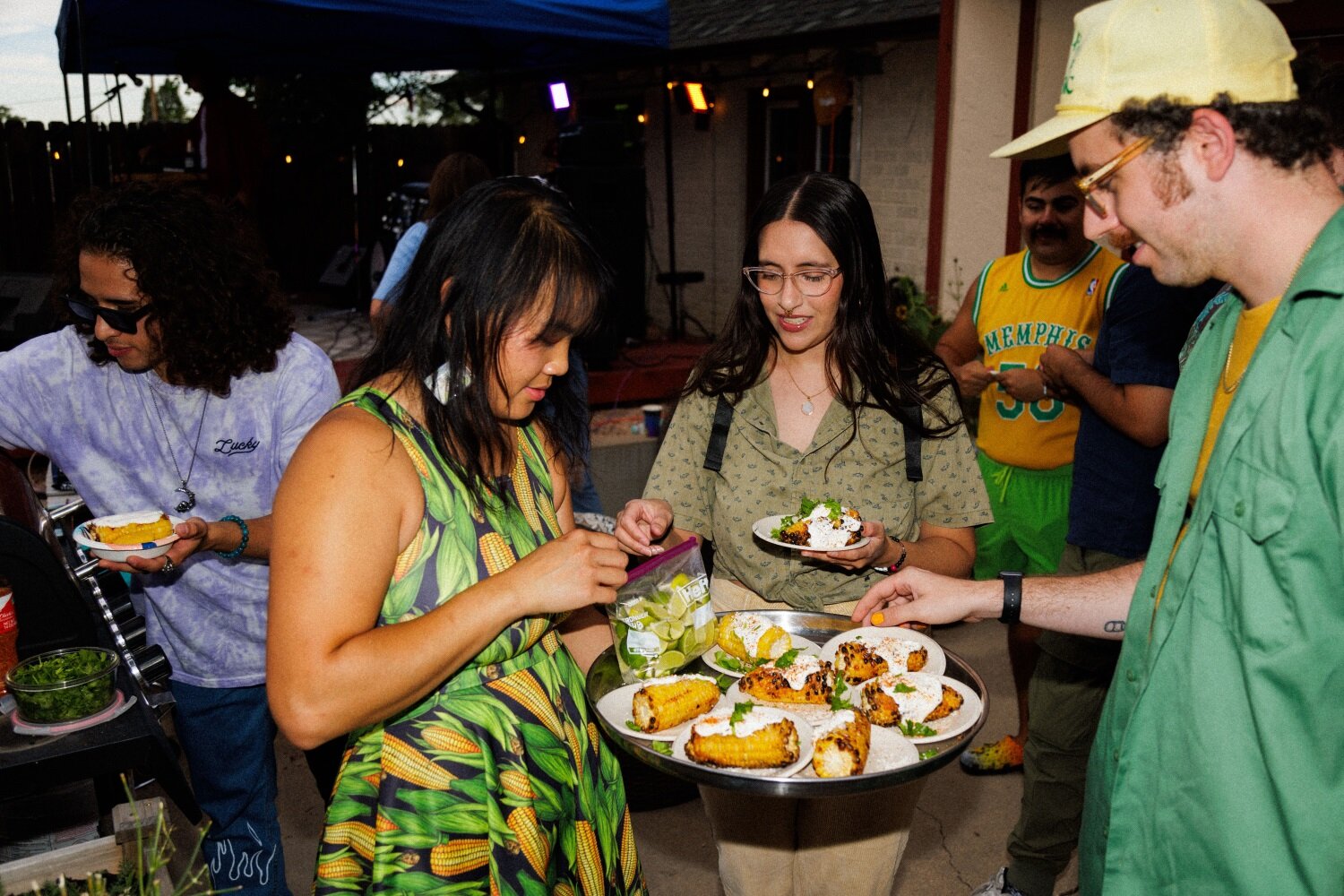Denver's DIY music scene is reviving as smaller, independent venues feel the crunch

DENVER — Distorted chords generated by a Moog Synthesizer pierce through warm Prophet X pedal tones. A man’s voice rings out, words about an unidentified flying object loop through the sonic atmosphere of the low-lit garage.
It’s experimental music night at Seventh Circle Music Collective, a volunteer-run, sober DIY (do it yourself) music space off Federal Boulevard, open to all ages. In addition to noise music, the venue also hosts hardcode shows, punk/metal, psych folk and even country music.
Seventh Circle touts its inclusivity. A pride flag is posted out front and Black Lives Matter stickers adorn most doors, walls, and the ceiling.
Taking a political stance is not without risk. The space became victim to a hate crime in 2021, explained Eric Salazar, a volunteer for Seventh Circle. A brick with a Nazi symbol was thrown through the window. More recently, someone came and smashed up the sound board with a hammer.
“It’s incredibly disrespectful and horrible that some people feel the need to resort to property damage for no reason” said Lucyfer, another Seventh Circle volunteer and founder of BiteSize Productions.
Acts of vandalism haven’t discouraged the musicians or concert-goers who continue to show up. In fact, Seventh Circle is experiencing a revival this year.
“I have the numbers to back it up because I do a lot of finance work for Seventh. Post-pandemic, our attendance year-over-year has jumped up 30 percent on the average show,” said Salazar, who is CPA-certified. “This year most of the bookers have had at least one show that was like one of the biggest of all time. Each one has found independent success booking really successful shows. It feels like we probably are doing a better job this year than prior years.”

Seventh had what is believed to be its highest attended event ever since its founding in 2012. The Denver Underground Pride Fest brought in over 400 attendees. “There’s comedy, there's music, there's so many different types of genres: a pop artist, and then the next thing will be a noise artist, and then we'll have a punk band,” said Lucyfer, who organized the event and has volunteered at Seventh for over a decade. “Every single person that played, every single vendor, every single person that performed, every person that worked there, it was all queer."
Lucyfer said their main goal has been to make Seventh Circle more queer-inclusive. And thanks to their efforts, the DIY scene is beginning to showcase more LGBTQ+ music and art.
“It’s an intentional way to welcome folks in because trans rights are under attack and women's rights are under attack,” said Alicia ‘Bruce’ Trujillo, a music industry professional. “You need to take a stand. You’re either going to welcome these people or you're not.”
Historically, diversity wasn’t an explicit priority of the DIY music scene. “The scene was really not an inclusive space for folks of color or the wide spectrum of queerness," explained Bree Davies, podcast host for City Cast Denver. “Fifteen years ago, like a lot of things, it was dominated by white dudes.”
Poly Armory, a group of friends began hosting queer-focused, free DIY shows because they feel a responsibility to cultivate a queer music scene that isn’t being cultivated in the ways we’d like to see it, said Possum, one of the founders. “We keep the space all ages because there really isn’t a whole lot of all age spaces in Denver, and we can give space to people that would otherwise not have it.”

A lot of the people doing the DIY stuff here are queer, said Possum. “There’s been a lot more open queerness in this scene because of how many people are coming here, moving here and trying to find a community that they didn't have or trying to start communities that didn't really exist."
These safe spaces are important for young people. “Queer teenagers being able to just exist in a space and not have to buy anything and not be told that they're loitering. They could just chill there all day and hang out and make friends, it was just so beautiful,” Lucyfer added.
Like most of the performance arts, the DIY scene struggled in 2020 during COVID-19-related lockdowns. It first took a hit five years prior though. In 2015, a fire at Oakland’s Ghost Ship warehouse, which killed 36 people, prompted cities across the country to crack down on DIY spaces that were not up to code. Some DIY institutions in Denver including, Rhinoceropolis were shuttered. Stricter permitting laws coupled with a spike in rent prices in recent years have squeezed the local music scene in Denver.
It has been particularly hard on independent venues that need to turn a profit. To offset higher operation costs, the venues increasingly work with national promoters like AEG and Live Nation. These companies have taken over more and more stages throughout the city and the state since 2016, explained Trujillo.
Independent venues need to fill their rooms in order to survive, and AEG has the resources to offer a higher price point to guarantee artists come to their venues, explained Trujillo. This has consequences for local musicians.
AEG and Live Nation decide who is on the bill, and sometimes they don’t even have a local opener, said Davies. “When I was in high school, there’d be three local openers on a national shows. The opportunities are becoming less and less as national promoters take over booking for these smaller venues and that creates a bigger struggle for local artists here. It takes a lot of steps before becoming the band that plays at Red Rocks.”
It could also hurt diversity. “Who is booking for those rooms? Are we getting a good representation of acts? Is it still the good old boys system? Could we give that room to a Black or a brown artist or a queer artist or a disabled artist? We are in 2023 how are we still getting white all male line-ups?”

Many music venues in Denver also have a “Pay to Play" model. "You can pay $500 to play, and that usually means that you probably won't leave with any money. A lot of the $500 is coming out of your own pocket,” said Lucyfer.
It's not just performers who are struggling. Many concert-goers have expressed frustration with the hidden service fees associated with Ticketmaster.
Young people are hungry for alternatives to the typical corporate model, especially for creative spaces, which is part of Seventh Circle’s mission: to provide a space for musicians and artists “in the underground outside of the confines of traditional corporate spaces.”
“I just thought it was so magical in this world that like, you're going to go to a show and just pay money, and not like have to pay service fees or like download an app,” said Salazar.
But as the surviving DIY spaces — Seventh Circle, Glob and DIY house shows — pick back up, newer spaces are popping up across Denver offering alternative ways for people to make art and build community in a safe, affordable and inclusive environment.
Trujillo is opening up a venue in Aurora called Manos Sagrados later this year which, she said, toes the line between a DIY space and an independent venue. Both a concert hall and artist studio, it will be “specifically for the communities that we live in,” she explained. “My talent buyer is a queer Black artist here in town. My production manager is Chicano. The person who's running my studios is Chicano. I identify as a queer Chicana. So it's building the community from within and making sure that it's we're representing and opening the door for a lot of different people, but it's not like insincere.”
Andrea Huang, with her co-founder Jason Edelstein, recently established Salt Lick Denver, a creative agency and recording studio that’s a for-profit venture, but also hosts community-focused and donation-based events. “One of the biggest events, hosted at our home, is called Cornhole Hub, a celebration of Colorado corn.” In attendace were bands, had fire spinners and a bunch of other friends who are art vendors. Huang and Edelstein cooked a lot of corn-related food. It's open to the public and encourages people to make a donations; 300 people attended this past August.

D3 in Westwood is a sober, nonprofit performing arts space established by father-daughter pair Santiago and HuitziloXochitl Jaramillo, who are of Mexican descent. The model allows them to do more programing. “We’re able to do the four drag shows, we have like noise sets, art shows. It just leaves more room for people to kind of get a little bit more experimental and like explore different types of performances."
D3 Arts is the “greatest example right now of the current DIY community centered space that really prioritizes folks of color, that really prioritizes these intersections of culture in a way that we weren't really doing before,” said Davies.
“I would say that's been the most beautiful evolution of it. DIY is so much more inclusive than it ever was.”
Lizzie Mulvey is the executive producer of investigative journalism at Rocky Mountain PBS. You can reach Lizzie at lizziemulvey@rmpbs.org.